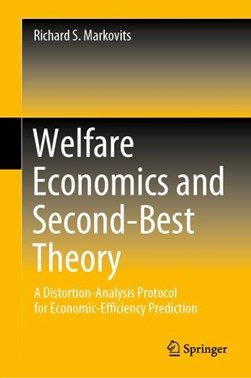-
BROWSE 1000s OF BOOKS IN STOCK
-
FREE DELIVERY ON ORDERS OVER €10
Welfare economics and second-best theory
Hardback
This book examines the implications of The General Theory of Second Best for analyzing the economic efficiency of non-government conduct or government policies in an economically efficient way. It develops and legitimates an economically efficient economic-efficiency-analysis protocol with three unique characteristics: First, the protocol focuses separately on each of a wide variety of categories of economic inefficiency, many of which conventional analyses ignore. Second, it analyzes the impact of conduct or policies on each of these categories of economic inefficiency, primarily by predicting the respective conduct's/policy's impact on the distortion that the economy's various Pareto imperfections generate in the profits yielded by the resource allocations associated with the individual categories of economic inefficiency-i.e., on the difference between their profitability and economic efficiency. And third, it is third-best-i.e., it instructs the analyst to execute a theoretical or empirical research project if and only if the economic-efficiency gains the project is expected to generate by increasing the accuracy of economic-efficiency conclusions exceed the predicted allocative cost of its execution and public financing. The book also uses the protocol to analyze the economic efficiency of specific policies so as to illustrate both how it differs from the protocols that most applied welfare economists continue to use and how its conclusions differ from those produced by standard analysis.
€89.89

269 Reward Points
In stock online
Extended Range: Delivery in 2-3 working days
Extended Range: Delivery in 2-3 working days
Free Delivery on this item
Any purchases for more than €10 are eligible for free delivery anywhere in the UK or Ireland!
This book examines the implications of The General Theory of Second Best for analyzing the economic efficiency of non-government conduct or government policies in an economically efficient way. It develops and legitimates an economically efficient economic-efficiency-analysis protocol with three unique characteristics: First, the protocol focuses separately on each of a wide variety of categories of economic inefficiency, many of which conventional analyses ignore. Second, it analyzes the impact of conduct or policies on each of these categories of economic inefficiency, primarily by predicting the respective conduct's/policy's impact on the distortion that the economy's various Pareto imperfections generate in the profits yielded by the resource allocations associated with the individual categories of economic inefficiency-i.e., on the difference between their profitability and economic efficiency. And third, it is third-best-i.e., it instructs the analyst to execute a theoretical or empirical research project if and only if the economic-efficiency gains the project is expected to generate by increasing the accuracy of economic-efficiency conclusions exceed the predicted allocative cost of its execution and public financing. The book also uses the protocol to analyze the economic efficiency of specific policies so as to illustrate both how it differs from the protocols that most applied welfare economists continue to use and how its conclusions differ from those produced by standard analysis.

269 Reward Points
Any purchases for more than €10 are eligible for free delivery anywhere in the UK or Ireland!
€89.89

269 Reward Points
Any purchases for more than €10 are eligible for free delivery anywhere in the UK or Ireland!
Product Description
This book examines the implications of The General Theory of Second Best for analyzing the economic efficiency of non-government conduct or government policies in an economically efficient way. It develops and legitimates an economically efficient economic-efficiency-analysis protocol with three unique characteristics: First, the protocol focuses separately on each of a wide variety of categories of economic inefficiency, many of which conventional analyses ignore. Second, it analyzes the impact of conduct or policies on each of these categories of economic inefficiency, primarily by predicting the respective conduct's/policy's impact on the distortion that the economy's various Pareto imperfections generate in the profits yielded by the resource allocations associated with the individual categories of economic inefficiency-i.e., on the difference between their profitability and economic efficiency. And third, it is third-best-i.e., it instructs the analyst to execute a theoretical or empirical research project if and only if the economic-efficiency gains the project is expected to generate by increasing the accuracy of economic-efficiency conclusions exceed the predicted allocative cost of its execution and public financing. The book also uses the protocol to analyze the economic efficiency of specific policies so as to illustrate both how it differs from the protocols that most applied welfare economists continue to use and how its conclusions differ from those produced by standard analysis.
Product Details
ISBN9783030433598
FormatHardback
PublisherSPRINGER (31 May. 2020)
No. of Pages356
Weight765
Language English
Dimensions 235 x 155 x 25

